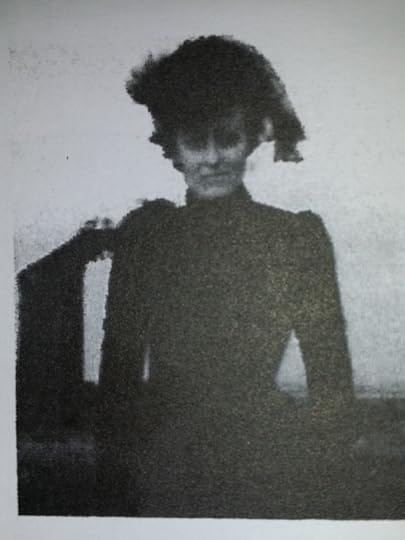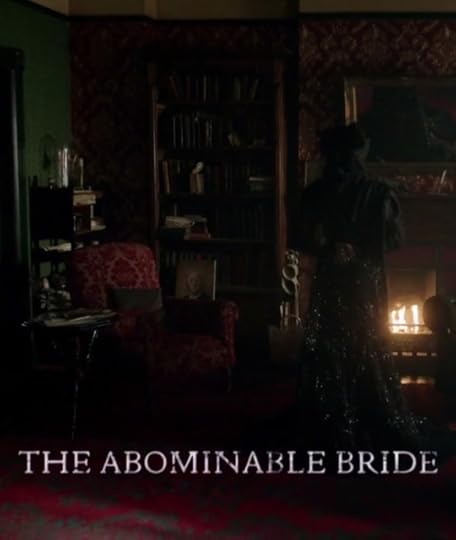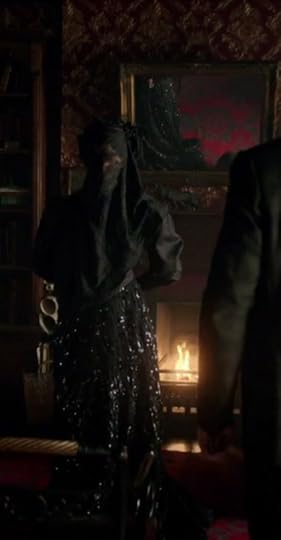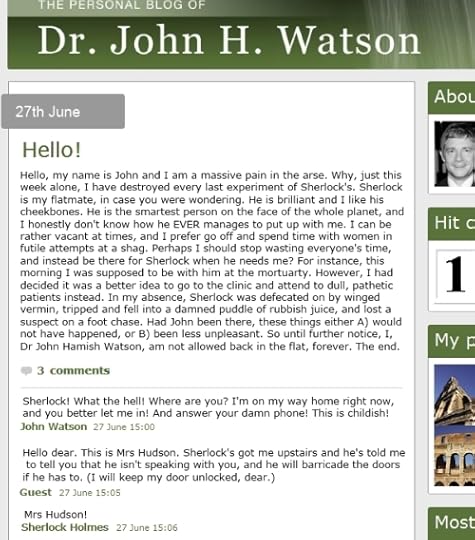XistentialAngst's Blog, page 84
August 19, 2016
The Woman in Black: Gothic Conventions in The Abominable Bride
I’ve been reading up on this a bit, and this is just a tiny something I found that I wanted to share. I know lots has been said about Mary’s dress at the start of TAB, and I haven’t been reading my meta as I probably should have (maybe someone has already found something else on this, Idk?), but this struck me as important regarding the interpretation of Mary in TAB. If you’re a Mary stan, this probably isn’t for you.
I present you with The Woman in Black.

This picture is featured in the article “Spectres of the Past” by R Clarke in Gothic.
The Dark Heart of Film. and shows one of the versions of the Woman in Black, Pauline Moran in the 1989 TV adaptation of a novel by Susan Hill.Remind you of anyone?

Yes.
Apart from blatantly blending in with the (significant) title, Mary is here in all black. Last time I read any meta about that was on this possibly being her mourning clothes–mourning the imminent loss of her husband who has abandoned her for “a companion of dubious morals”?–but when I read about more about The Woman in Black, this rung some bells, especially regarding the nature of Mary in TAB.
So, there are two traditional
Gothic archetypes: The Woman in Black and the grim reaper.The descriptions
given for The Woman in Black are very poignant: “Who was this
terrifying murderess with her satin sheen as glossy as a raven’s wing,
her face doubly obscured by a black face veil […]?” (Clarke
89-91). As mentioned, the woman in black is a
particular favourite among Gothic devices. Popularised in late 1800 with
Byron’s The Monk, she appears often as a nun, is
associated with “foreign malignancy” (she is often e.g. French or
Spanish) and vengeance. Summarised: She embodies “the notion of a deadly
murderess, a foreigner, a woman in black capable of returning from the
grave” but “sometimes The Woman in Black doesn’t even have to be a
ghost. Sometimes she has just the suggestion of the deathly” (ibid.
91).A reading of Mary as The Woman in Black is easy: she’s speculated to be foreign (”your accent is currently English but I suspect you are not”), is confirmed as a murderess (her past; ”all those wet jobs for the CIA”; explicitly shooting Sherlock), up here wears explicitly black (in an episode Sherlock attempts to figure out Moriarty’s supposed return from the dead), and she might simultaneously be a ghost (the ghost of Moriarty?) and she definitely is suggestive of the deathly. To me, this quite confirms her reading as villain and shows me that Mofftiss are more than aware of what they’re doing, and why.
It becomes even more fun when you see this:

Correct me if I’m wrong, but this is one of the few instances in TAB in which we have a mirror coming up (besides the one that is broken for Pepper’s Ghost). Mirrors are a Gothic convention with two functions: according to Showalter’s queer reading of Dr Jekyll & Mr Hyde (Sexual Anarchy), a mirror is a symbol of homosexual literature revealing the hidden, repressed self, a confrontation with one’s own desires (strikes me as a fitting analogy for the Pepper’s Ghost’s mirror breaking; the Ghost can’t be recreated fully since Holmes refuses to believe in them, keeps running from his own metaphoric ghosts?); in the Gothic occult, however, “what the glass shows us is a ‘double’, a menacing second self.” (ibid. 50) This goes hand in hand with the general idea of doubles being uncanny in Gothic fiction, and guess what? This is also often linked to twins, “ominous portents” (ibid. 39).
So Mofftiss have done it again–handed us the meaning right at the start before leading us down the rabbit hole. They often do that: they gave us Irene and Mycroft’s line of “this was textbook. The promise of love, the pain of loss, the joy of redemption… then give him a puzzle and watch him dance.”
They’ve given us the formula of what’s going to happen, or of how we should read this, Mary: as The Woman in Black. I’m fully on board with this and won’t believe in any saccharine sob backstory anymore.
Anyway, right now we’re all watching Sherlock dance. It is a rather bittersweet dance; hopefully next time he won’t be dancing alone in his living room but with John.
"Oddly I was at the Baker Street Babes thing last night, and they said ‘you like trolling the..."
-
Steven Moffat
http://www.withanaccent.com/2016/07/28/sdcc-2016-sherlock-a-study-in-secrecy/
(via bakerstreetstorytime)
Remember This!
(via tildathings)
The Dichotomy of John Watson
John’s bisexuality is only one of the traits found in this character. Let us look at the others:
The healer and the warrior: doctor and soldier. Killer and saviour. John killed a man to save Sherlock. He’d do it again. Will do it again.
The romantic and the platonic: John vents all his romantic love for Sherlock subconsciously in his writing, and deep in his eyes when he looks at Sherlock. (Sherlock has subconsciously picked up on this) Yet John represses that love and maintains a facade of platonic affection. It fools many people.
The temperate man and the angry man: John hides behind accepted social norms, people view him as calm and controlled, even moderate. He isn’t, he seethes with anger. Anger at life, anger at self repression, anger at his own wants and needs, anger at his inability to have the man he craves.
The bad liar and the good liar. John’s reputation is that he is a bad liar, Sherlock’s decision to keep John in the dark during his hiatus was predicated by this. Yet John lies to people everyday. The married facade, earlier the initial weeks of a new relationship with a female, the contented GP in his surgery tending to mundane ailments, and the whole Sholto affair that he managed to keep from the most observant man on the planet. John even lies to himself and believes it! John is lying in his reconciliation with Mary and maybe covert work for Mycroft. John is a far better liar than his reputation would have people believe.
The nurturer and the nurtured. John has an assumed persona of a nurturer; the domestic nesting qualities associated with domesticity. Yet Sherlock in actuality is the nurturer in the relationship. He feeds John, makes the tea, considers John’s creature comforts to the point of encouraging outlets for John sexually, even to the point of supporting John’s marriage.
The damsel and the knight. In TBB, TGG, TRF, TEH and HLV Sherlock saves John. But Sherlock knows that in all actuality it is John who saves him. In ASiP John physically saved Sherlock, but in every episode John Watson emotionally saves Sherlock, he even tried in TSoT to throw Sherlock an opportunity to stop the marriage (stag night) and in TAB this arc was highlighted in the save at the falls from the very thing that is killing them both: Their fear to deal with their sexual attraction and the fact they are IN love. John kicked that over the cliff. In series 4, John will be the knight, one BAMF when pushed.
Lovely observations.
August 18, 2016
Martin Freeman in Ghost Stories
THis looks great!
Warp Films’ big-screen adaptation of Ghost Stories willfilm in Yorkshire in the autumn.
The feature is based on the supernatural stage production by Andy Nyman and Jeremy Dyson about a psychology professor who received a letter seemingly from beyond the grave. The play opened at the Liverpool Playhouse in 2010 and later transferred to the West End for a year.
The audiences were asked not to reveal much about the production so as to avoid spoilers – instead the marketing materials showed the shocked reactions of the theatregoers as the show unfolded.
Nyman and Dyson will direct the film version from their own screenplay. Nyman will also star along with Martin Freeman.
Details of other key personnel including the producers, casting director and line producer (from 19 August) can be found on Production Intelligence along with the likely shooting schedule.
FYI Andy Nyman talked about it a bit in a podcast at the end of June. He also said then that it was filming in October. I did a tumblr post on it at the time which I’m too lazy to go find. The bit about Martin and Ghost Stories was near the end.
https://twitter.com/talkfortwo/status/744975375114055680
I saw this production in the West End, it was brilliant and shocking and very scary. I’m incredibly excited to see this on screen.
So cool to get someone’s opinion who say the play. I love ANY kind of ghost story in film and there aren’t many good ones, so I’m super excited about this for various reasons!
@1895itsallfine thanks for the podcast link!
Martin Freeman in Ghost Stories
THis looks great!
Warp Films’ big-screen adaptation of Ghost Stories willfilm in Yorkshire in the autumn.
The feature is based on the supernatural stage production by Andy Nyman and Jeremy Dyson about a psychology professor who received a letter seemingly from beyond the grave. The play opened at the Liverpool Playhouse in 2010 and later transferred to the West End for a year.
The audiences were asked not to reveal much about the production so as to avoid spoilers – instead the marketing materials showed the shocked reactions of the theatregoers as the show unfolded.
Nyman and Dyson will direct the film version from their own screenplay. Nyman will also star along with Martin Freeman.
Details of other key personnel including the producers, casting director and line producer (from 19 August) can be found on Production Intelligence along with the likely shooting schedule.
britpieceofshit:
Best thing i have read tonight.
artfulkindoforder:
fyeahfreebatch:
The host of the 2010 Crime...
August 17, 2016
TAB is not mind palace, sez Mycroft
I was just reading this interesting exchange here about TAB being a dream and not MP and it reminded me of something.
I apologize if this has been brought up before–it likely has and I’ve either forgotten or missed it. Anywho, this line during TAB from Mycroft…
MYCROFT (looking across to him): You really think anyone’s believing you?
JOHN: No, he can do this. I’ve seen it – the Mind Palace. It’s like a whole world in his head.
SHERLOCK (frustrated): Yes, and I need to get back there.
MYCROFT: The Mind Palace is a memory technique. I know what it can do; and I know what it most certainly cannot.
SHERLOCK: Maybe there are one or two things that I know that you don’t.
Isn’t this a bit odd? Mycroft is essentially telling us that the MP technique ‘most certainly cannot’ lead to the state Sherlock claims to be experiencing. MP is a ‘memory technique’, not a state in which one hallucinates entire stories and alternate realities. Sherlock’s quip back is meant to imply that maybe he can do such things with his MP, but seriously. Isn’t Mycroft the smarter brother? Why include this line in the dialogue at all unless Mycroft is trying to tell us something (i.e. setting up a future reveal) – the sections of 1895 in TAB are not MP.
If they are not MP, what else could they be? A dream is pretty much all that’s left. And if the 1895 segments are a dream, then in all likelihood so are the ‘modern’ scenes in TAB because one doesn’t go in and out of a dream state the way Sherlock seems to on the plane.
@
tjlcisthenewsexy @monikakrasnorada @
wssh-watson
If you’ve taken drugs that make you unconscious you could go in and out? I think I’ve seen a group (and agreed with them) since TAB aired who’ve said people are using the phrase MP wrong here that it’s really more like a dream. Some are able to have more control of their dreams too so even if it seems strange that he initially chose to have this dream to analyze it certainly seemed familiar how he wanted to “go back to it” as we all do with a dream we were enjoying or wanting to finish? OR it also makes sense to me that someone who had the ability to go into somewhat altered states of consciousness where they’re not noticing things around them (which we know he does) would be at risk if they attempted to do that when severely impaired it might turn *into* a dream and they would lose control of it?
Hmm. Yes, I guess Mycroft’s comment could be implying that Sherlock is stoned (vs MP). And if he was stoned, it might enable a hallucinatory state (vs dream state).
However, I’ve always had such a problem with the drugs/overdose thing anyway. In the sections on the modern day plane Sherlock does not ACT stoned. Compare his coherent speech and controlled movements with the way he acted, for example, when he was ‘drugged’ in the pilot by the cabbie or by Irene in ASiB. It’s always really bothered me that they keep calling it an “overdose” when he’s really showing no signs of being high, much less being sick, convulsing, vomiting etc, on the plane.
If they really intended TAB to be drug-induced hallucinations, they could easily have made Sherlock act/sound more high and go in and out of 1895 in a more drugged out way. <shrug>
Oooo, @1895itsallfine’s comment about ‘altered states of consciousness ’ just twigged something for me I hadn’t thought about before. But in TAB, we see Holmes ‘meditating’ on the floor of 221B before Moriarty arrives. Is this a possibility of what is happening?? And, as for Sherlock not seeming high in the modern plane scenes, I personally believe that’s because those moments aren’t 'real’ either and so that’s why it seems he’s not quite right.
Yes, that’s one reason I believe the plane scenes aren’t real either myself, because Sherlock’s “overdose” state is so sloppily done. That was my point though, is that, if the 1895 scenes aren’t MP, that’s another clue that the plane scenes also aren’t real. If all of TAB is EMP/EDT, I’m more prone to think it’s all some sort of coma dream state, which, given Sherlock’s intellect, could also have elements of MP and running scenarios lucidly. For that matter, perhaps he really is OD’ing and he dreams all the modern scenes while on the plane unconscious. But then that leaves the ending of HLV ‘real’ which I have my doubts about as well.
welovethebeekeeper:
Just clearing out my setlock folder. Yep,...

Just clearing out my setlock folder. Yep, Pinewood Studios, craft tables for Sherlock and oh….there’s a coffin!!! I don’t have the tweet/source on this, maybe @cupidford does? Not sure if others have posted this. Remember this could be a tease, or maybe not.
OK, so big leap here, but remember the speculation about the ‘horror’ that Sherlock is looking at in the S4 trailer being either John or himself dead? What if the coffin was used for that vision?
TAB is not mind palace, sez Mycroft
I was just reading this interesting exchange here about TAB being a dream and not MP and it reminded me of something.
I apologize if this has been brought up before–it likely has and I’ve either forgotten or missed it. Anywho, this line during TAB from Mycroft…
MYCROFT (looking across to him): You really think anyone’s believing you?
JOHN: No, he can do this. I’ve seen it – the Mind Palace. It’s like a whole world in his head.
SHERLOCK (frustrated): Yes, and I need to get back there.
MYCROFT: The Mind Palace is a memory technique. I know what it can do; and I know what it most certainly cannot.
SHERLOCK: Maybe there are one or two things that I know that you don’t.
Isn’t this a bit odd? Mycroft is essentially telling us that the MP technique ‘most certainly cannot’ lead to the state Sherlock claims to be experiencing. MP is a ‘memory technique’, not a state in which one hallucinates entire stories and alternate realities. Sherlock’s quip back is meant to imply that maybe he can do such things with his MP, but seriously. Isn’t Mycroft the smarter brother? Why include this line in the dialogue at all unless Mycroft is trying to tell us something (i.e. setting up a future reveal) – the sections of 1895 in TAB are not MP.
If they are not MP, what else could they be? A dream is pretty much all that’s left. And if the 1895 segments are a dream, then in all likelihood so are the ‘modern’ scenes in TAB because one doesn’t go in and out of a dream state the way Sherlock seems to on the plane.
@
tjlcisthenewsexy @monikakrasnorada @
wssh-watson
If you’ve taken drugs that make you unconscious you could go in and out? I think I’ve seen a group (and agreed with them) since TAB aired who’ve said people are using the phrase MP wrong here that it’s really more like a dream. Some are able to have more control of their dreams too so even if it seems strange that he initially chose to have this dream to analyze it certainly seemed familiar how he wanted to “go back to it” as we all do with a dream we were enjoying or wanting to finish? OR it also makes sense to me that someone who had the ability to go into somewhat altered states of consciousness where they’re not noticing things around them (which we know he does) would be at risk if they attempted to do that when severely impaired it might turn *into* a dream and they would lose control of it?
Hmm. Yes, I guess Mycroft’s comment could be implying that Sherlock is stoned (vs MP). And if he was stoned, it might enable a hallucinatory state (vs dream state).
However, I’ve always had such a problem with the drugs/overdose thing anyway. In the sections on the modern day plane Sherlock does not ACT stoned. Compare his coherent speech and controlled movements with the way he acted, for example, when he was ‘drugged’ in the pilot by the cabbie or by Irene in ASiB. It’s always really bothered me that they keep calling it an “overdose” when he’s really showing no signs of being high, much less being sick, convulsing, vomiting etc, on the plane.
If they really intended TAB to be drug-induced hallucinations, they could easily have made Sherlock act/sound more high and go in and out of 1895 in a more drugged out way. <shrug>
XistentialAngst's Blog
- XistentialAngst's profile
- 15 followers








